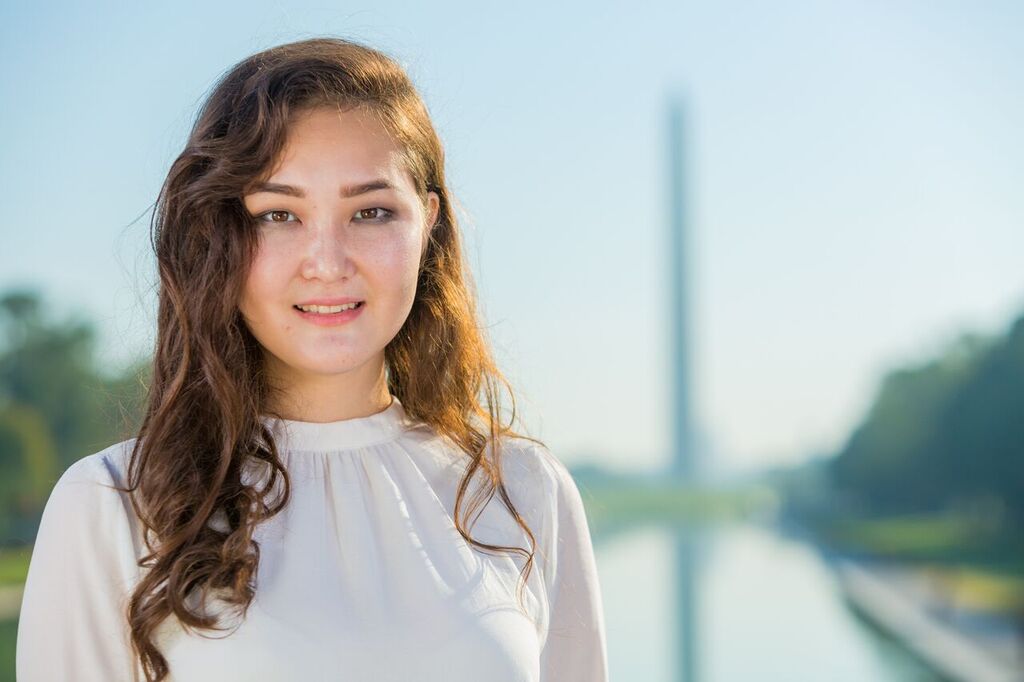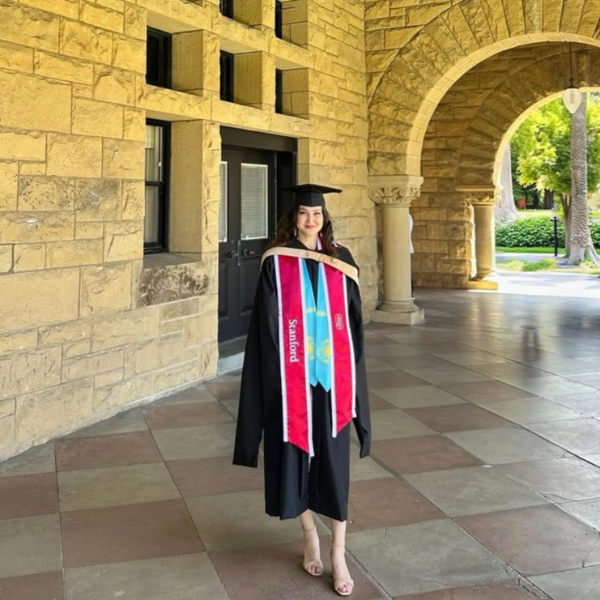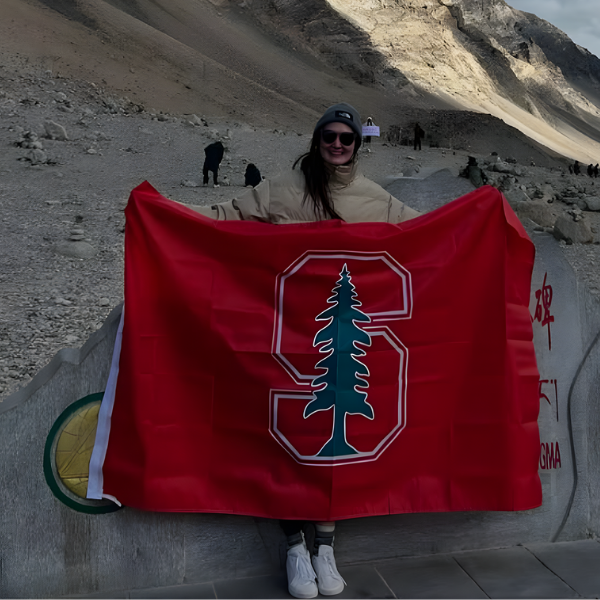FLEX Youth Cultural Opportunity: The First Step
At 16, Naza Aibar left her village in Kazakhstan for the first time to join the Future Leaders Exchange (FLEX) Youth Cultural Opportunity, an accelerated summer exchange program administered by American Councils. A standout student in Atalau—a town of fewer than 10,000 where she had already maxed out every opportunity in English, dance, and music—FLEX opened doors she didn’t know existed. “FLEX YCO changed my life, no exaggeration,” she says. “I grew up in a town with one school and very limited opportunities. Getting in was huge.”
That summer in the United States was eye-opening. Naza explored California, volunteered in Sequoia National Park, and journaled her experiences each night. “I hadn't even been to a big city in Kazakhstan before, and then they showed us Hollywood, San Francisco, Las Vegas. It was a dream come true,” she says. “The biggest shock was the kindness of the American families who hosted us voluntarily. I had never seen that before.”
Upon returning to Kazakhstan, Naza threw herself into FLEX alumni initiatives. She led a Global Youth Service Day (GYSD) project supporting orphans in her region, mentored other FLEX students at the FLEX-Ability Camps in Bishkek, and began developing the professional skills she carries today.
A Global Education, One Opportunity at a Time
Naza's time in the U.S. was just the beginning.
Urged by longtime American Councils director and mentor Rosa Thiele, Naza applied to the U.S.-Central Asia Education Foundation (U.S.-CAEF) Enterprise Student Fellowship Program and enrolled at KIMEP University, a prestigious western-style university in Almaty. “Everyone wanted Nazarbayev University because it was considered the top school,” she said. “But I chose KIMEP because of the community of American Councils alumni.”

Her decision paid off. During her undergraduate studies, she participated in American Councils’ Capstone Internship Program in Washington, DC—another rare opportunity for a Kazakhstan-based student to gain professional experience in the U.S. “It made me stand out completely."
While interning at 1776, a DC based venture capital firm, Naza encountered intercultural communication in action. “You don’t think about these things until you work in an international environment... it taught me how people from different cultures communicate and receive information.” After returning to Kazakhstan with her bachelors degree and professional internship experience, Naza set her sights abroad once again.
This time, in China.
Naza had studied Chinese throughout her undergraduate years and applied to the Yenching Academy at Peking University, one of the country’s most prestigious graduate programs. Her acceptance marked a new milestone as the first student from Kazakhstan to receive the program’s fully funded scholarship. Her time in China deepened her language skills, enriched her academic foundation, and established her at the crossroads of East and West, sharpening the global perspective that continues to guide her career.
A New Chapter in California

After her master’s in China, Naza launched into the tech world. She has since worked at McKinsey and Adobe; with each step bolstered by the foundation of cross-cultural agility she developed through international exchange. She applied to Stanford Graduate School of Business and, once admitted, became the only woman from Central Asia in her cohort.
At Stanford’s Human-Centered AI Institute, Naza explored the intersection of ethics and innovation. It became a time of reflection on her career, her country, and what it means to lead. “I used to think being a leader meant going first and shining the light for everyone,” she says. “Now I know leadership can also mean creating a space where everyone feels seen and safe.”
Naza challenged stereotypes just by showing up. “As a Central Asian woman, there are assumptions people make. But at Stanford, I learned that you don’t have to fight stereotypes directly. Just show up, deliver, and people will start to see you for you—not a category.”
In June, Naza crossed the Stanford commencement stage draped in Kazakhstan’s flag. Just weeks later, she made history again by authoring Stanford’s first-ever business case study focused on a Kazakhstani company.
Access Through Education: The Silicon Valley Startup Academy

Today, Naza is channeling her experiences into expanding access for the next generation of tech leaders. Alongside a group of peers, she co-founded the Silicon Valley Startup Academy—an internship program that connects high school students from developing countries with professional internships at companies across Silicon Valley.
“Something that matters most to me is education,” she says. “It was access to education that lifted me.”
That belief powers the Academy’s mission: to give students from regions where early internships aren’t the norm a chance to gain real-world experience. This summer, the Academy is hosting a cohort of students from Uzbekistan. “Many of these students could never afford an internship in the U.S. We’re helping them stand out when they apply to top universities.”
Looking Back, Scaling Forward
 Despite everything she’s accomplished, Naza still sees her earliest achievements as the most impactful. “Given my family and socioeconomic background, every next step felt like a step up a ladder,” she says. “FLEX was the hardest, most stressful step. The KIMEP scholarship with U.S.-CAEF was another big leap. Now the steps feel less steep. Forbes is a fun addition. But FLEX changed my life.”
Despite everything she’s accomplished, Naza still sees her earliest achievements as the most impactful. “Given my family and socioeconomic background, every next step felt like a step up a ladder,” she says. “FLEX was the hardest, most stressful step. The KIMEP scholarship with U.S.-CAEF was another big leap. Now the steps feel less steep. Forbes is a fun addition. But FLEX changed my life.”
She’s especially grateful for the many young women who’ve reached out since the Forbes announcement. “They see someone who didn’t have everything as a child. They see a version of themselves.”
For Naza, that visibility matters. It’s a reminder that leadership doesn’t begin in a boardroom. It begins with access: with one open door, one trusted mentor, one life-changing experience abroad.
With American Councils by her side, Naza turned each opportunity into a steppingstone. Now, she’s helping others redefine what leadership can look like, and who gets to rise.
